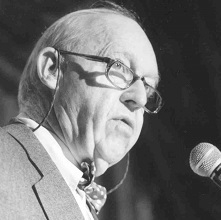Tom Winship

As the editor of The Boston Globe for two decades, Thomas Winship propelled the newspaper to regional leadership and national stature, in part through tireless coverage of the court-ordered school busing that split the city in the 1970's.
Winship, who started out as a reporter in Washington, grew up in a newspaper family. His grandfather A. E. Winship had been editor of The Boston Traveller. His father, Laurence, joined The Globe in 1911 as a reporter and was named editor in 1955. Thomas Winship succeeded him in 1965 and by his retirement in 1984 built The Globe's circulation and prestige in a period of often disruptive economic and social change.
At the height of the busing dispute, bullets flew through The Globe's newsroom windows. Winship made The Globe the third newspaper, after The New York Times and The Washington Post, to defy government secrecy and publish the Pentagon papers on the Vietnam War. His staff covered the school busing crisis with such voluminous and balanced reporting that it was awarded a Pulitzer Prize in 1975. The paper won 12 Pulitzer Prizes under his leadership.
Winship believed that quality journalism was good business, and he proved it, expanding The Globe's coverage of sports, science and the arts. When he began, there were five newspapers in Boston and The Globe was just beginning to pull ahead of The Boston Herald in circulation. In his tenure The Globe's daily circulation rose by 40 percent, to 520,000, and Sunday circulation by 50 percent, to 792,786. The newspaper became dominant, though some purists worried that its focus had become more suburban as its circulation crept ever outward.
Succeeding his father in 1965, he immediately defined himself as his own man by taking on the remnants of McCarthyism, decaying neighborhoods and racial segregation, subjects on which his father's Globe had often declined to comment. The Globe won its first Pulitzer Prize for articles on the unsuitability for the federal bench of Francis X. Morrissey, a Kennedy family retainer.
Winship broke more new ground by banning advertisements from the front page and eliminating the signature ''Uncle Dudley'' from editorials, which had been a folksy tradition at The Globe. The newspaper also made its first political endorsement in 72 years, for Kevin H. White over Louise Day Hicks, a school board member and busing opponent, in the 1967 mayoral race. He signed up columnists like Ellen Goodman and Peter Gammons, the baseball writer.
After his retirement from The Globe, he was the first senior fellow at the Gannett Center for Media Studies (now the Freedom Forum) and the founding chairman of the Center for Foreign Journalists, now the International Center for Journalists.
Thomas Winship was born in Cambridge, Mass., on July 1, 1920. Soon after, his family moved to Sudbury, a farming community 16 miles west of Boston. Winship followed his father to Harvard, where he founded the ski club and met Elizabeth Coolidge, who became his wife.

